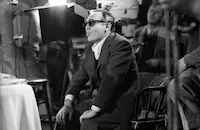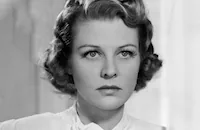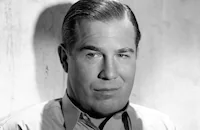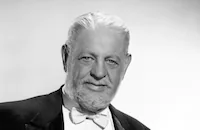Fast Company

Brief Synopsis
Cast & Crew
Edward Buzzell
Melvyn Douglas
Florence Rice
Claire Dodd
Shepperd Strudwick
Louis Calhern
Film Details
Technical Specs

Synopsis
Joel Sloane, a New York City rare book dealer, cannot make a living selling first editions. He picks up extra money from insurance company rewards, however, by recovering missing rare books, much to the relief of his secretary Garda, who is also his wife. When one of their friends, Ned Morgan, is released from prison after serving time for stealing books from Joel's competitor, Otto Brockler, Garda wants Joel to give Ned a job because she knows he is innocent. Ned, who is in love with Brockler's daughter Leah, meanwhile confronts Brockler and accuses him of stealing the books himself. After Ned leaves Brockler, Eli Bannerman and Sidney Z. Wheeler arrive, Brockler's secret partners, who work with him to steal the books then collect the insurance. The next day, Leah goes to Garda and tells her that she is worred about Ned, who is embittered toward her father. That night, insurance company representative Steve Langer and police Lt. James Flanner inform Joel that Brockler has been murdered and Ned is the prime suspect. Neither Leah or Garda believe that Ned is guilty and Garda tells Joel that she has noticed Brockler's secretary wearing expensive jewelry and furs. Joel then invites Julia to lunch, says that he needs a partner and suggests that she could help him "find" some of the rare books that have been stolen recently. Julia is interested in Joel's proposition and they agree to meet in her apartment at nine. He then runs into Ned on the street and suggests that they meet at midnight. When Joel goes to Julia's, she says that Brockler kept a secret room containing his "stolen" books. Joel then calls the police to tell them about the room and learns that Ned has been arrested. Though Ned's attorney, Arnold Stamper, makes Ned tell the police that Joel had given him money to leave town, Stamper tells Joel that it was really Julia who had offered Ned money to leave. Meanwhile, Bannerman goes to Wheeler and tells him that the police suspect him of murder. They then call Joel and, pretending to be from the district attorney's office, ask him to come down. When Joel arrives, they shoot at him and think that he is dead. Bannerman then kills Wheeler. Soon Julia goes to Bannerman and tells him that Joel is alive. The two threaten each other but Julia stops the argument by saying that she has papers on their arrangement that could prove that he killed Brockler. Bannerman then hires thug Danny Scolado to kill Joel. When Joel, whose flesh wound on the posterior requires his use of a rubber doughnut to sit upon, goes to Julia's apartment, her papers are strewn on the floor. Then, while she is in the bedroom, Joel looks at a photograph of her and Bannerman, unaware that Bannerman is secretly hiding in the bedroom with a gun. Bannerman demands money and the papers from Julia, but she refuses and he knocks her out, then runs away. Joel calls the police to arrest him, then searches his office with Langer. On the way back to Langer's office, the cab driver is Scolado who drives Joel to a hideout. Soon Bannerman arrives, holding Garda at gunpoint. While Joel gets the better of his captor, Garda kicks out the light plug, causing chaos. The police soon arrive, but Bannerman has escaped. Joel then goes's to Julia, who finally confesses, gives him a list of stolen books and says that Bannerman killed Brockler. Joel then tells her that he is convinced that she killed Brockler. She throws a knife at him, but misses just as Bannerman arrives. Joel then overpowers Bannerman as Lt. Flanner arrives to arrest Julia and Bannerman. Finally, Garda grabs Joel and, after handcuffing him, says "Let me be your doughnut."

Director

Edward Buzzell
Cast

Melvyn Douglas

Florence Rice

Claire Dodd

Shepperd Strudwick

Louis Calhern

Nat Pendleton

Douglas Dumbrille

Mary Howard

George Zucco

Minor Watson

Donald Douglas

Dwight Frye

Thurston Hall
Horace Macmahon
Roger Converse
Natalie Garson
Henry Sylvester
Edward Hearn
James B. Carson
Ronnie Rondell
Jack Foss
Barbara Bedford
Crew
Dr. William Axt
Clyde Devinna
Cedric Gibbons
Charles O'malley
Marco Page
Gabriel Scognamillo
Douglas Shearer
Fredrick Y. Smith
Frederick Stephani
Harold Tarshis
Dolly Tree
Edwin B. Willis

Film Details
Technical Specs

Articles
Fast Company (1938)
By Frank Miller

Fast Company (1938)
Quotes
Trivia
Notes
Television prints of this film sometimes bear the title The Rare Book Murder. Marco Page, whose real name was Harry Kurnitz, became a staff writer at M-G-M after completing this, his debut picture, and wrote two additional films featuring the characters Joel and Garda Sloane, Fast and Loose, directed by Edwin L. Marin, starring Robert Montgomery and Rosalind Russell, and Fast and Furious, directed by Busby Berkeley, starring Franchot Tone and Ann Sothern. Both of the sequels were released in 1939 ( entries). Throughout his career, his novels, plays and films were alternatively written under the names Page and Kurnitz. A pre-production Hollywood Reporter news item noted that Claire Dodd was borrowed from RKO for the film. According to modern sources, exhibitors were unhappy at the long intervals between pictures in The Thin Man series, so M-G-M made Fast Company because its "light" detective theme featured main characters in the Nick and Nora Charles mode. According to a September 26, 1938 news item in Hollywood Reporter, because of his success in the Joel Sloane role, Douglas was seriously considered as a replacement for William Powell as Nick Charles while Powell was recuperating from surgery. Powell did complete the series, however.















